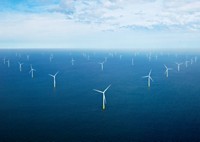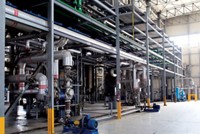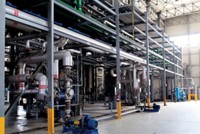Advertisement
Grab your lab coat. Let's get started
Welcome!
Welcome!
Create an account below to get 6 C&EN articles per month, receive newsletters and more - all free.
It seems this is your first time logging in online. Please enter the following information to continue.
As an ACS member you automatically get access to this site. All we need is few more details to create your reading experience.
Not you? Sign in with a different account.
Not you? Sign in with a different account.
ERROR 1
ERROR 1
ERROR 2
ERROR 2
ERROR 2
ERROR 2
ERROR 2
Password and Confirm password must match.
If you have an ACS member number, please enter it here so we can link this account to your membership. (optional)
ERROR 2
ACS values your privacy. By submitting your information, you are gaining access to C&EN and subscribing to our weekly newsletter. We use the information you provide to make your reading experience better, and we will never sell your data to third party members.
Business
Biobased chemical start-ups seek niche in Europe
Young firms are bullish but must combat low oil prices, paucity of funding, and rising global competition
by Alex Scott
May 9, 2016
| A version of this story appeared in
Volume 94, Issue 19
Michael Carus is a physicist and the charismatic head of the German biotechnology market research firm Nova Institute. Readily recognized by his foot-long beard, he enthuses about the prospects for nascent biobased chemical firms located in Europe.
Note: Total sales of biobased chemicals for the 28-member EU were approximately $35.8 billion in 2013.
Sources: Biobased Industries Consortium, Nova Institute

Note: Total sales of biobased chemicals for the 28-member EU were approximately $35.8 billion in 2013.
Sources: Biobased Industries Consortium, Nova Institute
Carus argues that the region’s biomaterials industry is in a healthy growth phase. The current low price of fossil fuels has forced start-ups to look at areas that do not compete directly with oil.
Manufacturing capacity for biomaterials in Europe, including biopolymers, is on track to reach 1.7 million metric tons in 2020, up from 700,000 metric tons in 2011, according to Carus. The figures are roughly similar in the U.S., which is on course to reach 1.6 million metric tons of capacity in 2020, up from 500,000 metric tons in 2011.
The consulting firm KPMG attributes the anticipated growth to a shift in the market dynamic. “Now there is economic pull—at least in larger markets—as there are customers demanding biobased products,” said KPMG’s Carl Henning Reschke.
A recent meeting hosted by Carus’s firm in Cologne, Germany, attracted a dozen or so biomaterial start-ups keen to showcase their technologies. A number had cool-sounding chemistry pitched as being decoupled from the price of oil. But even those firms face the prospect of difficult funding conditions and rising international competition, experts at the meeting said.
One such company was Nafigate, a Czech Republic-based start-up that uses bacteria to convert waste cooking oil and water into polyhydroxyalkanoate (PHA). “We convert stinking, dirty material into a useful biopolymer,” said Lenka Mynarova, chief marketing officer for Nafigate. The firm says its Hydal process generates 0.7 kg of PHA, a biodegradable polymer with uses including eating utensils, food packaging, and agricultural mulch, for each 1 kg of oil.
The dirtier the oil, the more nutrients it contains for the bacteria, Mynarova pointed out. The oil that Nafigate sources is so dirty that it cannot be used for biodiesel production, she said.
It’s a major market opportunity, according to Nafigate, which estimates that 3 million metric tons per year of suitable oil is available in China alone. Production costs should be lower than sugar-based routes to PHA, Mynarova said.
German start-up Cysal has developed a fermentation process for making added-value chemicals from biomaterials. Using an engineered version of blue-green algae, the firm ferments sugar into amino acid dipeptides for products including animal feeds and cosmetics.
Dipeptides are taken up by the body more readily than single amino acids, resulting in faster growth when fed to animals or farmed fish, said Martin Krehenbrink, the firm’s chief technology officer. “They also provide better results in cosmetics for skin rejuvenation compared with amino acids,” he added.
“Dipeptides are the amino acids of the future,” Krehenbrink proclaimed. They are not yet being produced commercially via a biochemical route, although Evonik Industries recently opened a plant in Belgium to produce a dipeptide of methionine from petrochemicals as a fish farming nutrient. Cysal claims its bioprocess is cheaper than any chemical route.
Cysal was fostered by CLIB2021, a European network of biotech organizations. Like most of the start-ups at the Cologne meeting, Cysal was looking for investors.
A German start-up and another CLIB2021 member, 4Gene also is developing what it considers a biobased improvement on traditional chemistry. The firm’s Flavor-On-Demand is a process for making aromaglucosides—sugar molecules conjugated with standard fragrance or flavor compounds. Stable, odorless, and nonvolatile in the conjugated state, aromaglucosides release their flavor or fragrance when exposed to a certain pH, temperature, bacteria, or enzyme.
In the firm’s pipeline is a conjugate that releases the fragrance geraniol when exposed to microorganisms that grow in the presence of human sweat. It’s also looking at an “early warning system” for diapers. In the presence of an enzyme in urine, an aromaglucoside could release a citrus smell to alert parents, said Wilfried Schwab, 4Gene cofounder and a professor of biomolecular food technology at the Technical University of Munich, where the company started.
Aromaglucosides “are sleeping beauties that just need a kiss to release their aromas and flavors,” Schwab said. It is early days for the fledgling company, which received its first research grant on April 1.
Netherlands-based Skytree, another spin-off, this time from the European Space Agency, unveiled its ambitious plans to capture CO2 directly from air for resale as feedstock for biomaterials and fuel production.
Adapted from a system designed to extract CO2 from a spaceship’s cabin, Skytree’s technology features porous polymer beads 0.3–1.25 mm wide that are functionalized with amine groups that attract CO2 to their surface and release the gas when heated. The firm’s latest prototype generates a gas with a CO2 concentration of up to 20%.
“The cost is only two or three times that of capturing CO2 from an industrial waste stream. And we see a way to reduce costs,” said Max Beaumont, a Skytree cofounder and engineer.
Skytree is building a pilot facility in Germany. Near-term market opportunities may include continuous production of small volumes of CO2 for operators of commercial greenhouses, aquariums, and swimming pools, Beaumont said.
Other start-ups showing their hand at the Cologne meeting included Biotrem, a Polish company with a simple heat-and-pressure process for converting wheat bran into plates and packaging products, and Mycoplast, an Italian firm with a process for making packaging from fungi-derived mycelium.
Most of the firms at the meeting claimed their technologies avoid any adverse impact from today’s low oil and gas prices. An exception was Electrochaea, a German start-up developing a technology for converting waste CO2 and low-cost electricity into methane, which acknowledged it is currently limited by cheap energy.
Electrochaea’s biocatalytic methanation process uses methanogenic archaea bacteria. The process is about 60% efficient, said Doris Hafenbradl, chief technology officer.
She accepts that there is no investment opportunity in the U.S., where the price of natural gas is low. Rather, the firm is looking to countries such as Switzerland, where subsidies ensure that biomethane secures twice the price of regular methane.
Jim Philp, a policy analyst at the Organisation for Economic Co-operation & Development, an economic development group, expressed skepticism about the near-term prospects for some European start-ups because of the low cost of fossil fuels. Overall, however, Europe’s model of forming technology networks, such as CLIB2021 and the U.K.’s centers of excellence, are effective ways of fostering start-ups, he said.
Philp estimated that the collective revenues from biobased firms in Europe are roughly equal to those in the U.S. A weak point for European start-ups, though, is second-stage funding. “A significant part of European projects are financed by debt. This makes financing of big projects difficult,” he said.
Meanwhile, raising capital by listing on Europe’s financial markets is rarely an option for biomaterials firms owing to lack of investor appetite, according to Frank Goebel, of German-based finance company Brain Capital.
Such funding challenges mean that progress among European start-ups can be slow. Asian countries see this and are looking to capitalize on it. For example, Malaysia, a major producer of palm oil, is seeking to accelerate activity in biomaterials, Philp said, pointing to a phrase popular among Malaysian politicians: “In Europe they talk. In Malaysia we do.”
Even if Europe’s biomaterials start-ups dodged the bullet that is low-cost fossil fuel, there are challenges ahead, Philp warned. Poor financing options and strengthening global competition are threats that European biomaterials start-ups, such as the dozen showing their wares in Cologne, still have to overcome.





Join the conversation
Contact the reporter
Submit a Letter to the Editor for publication
Engage with us on Twitter